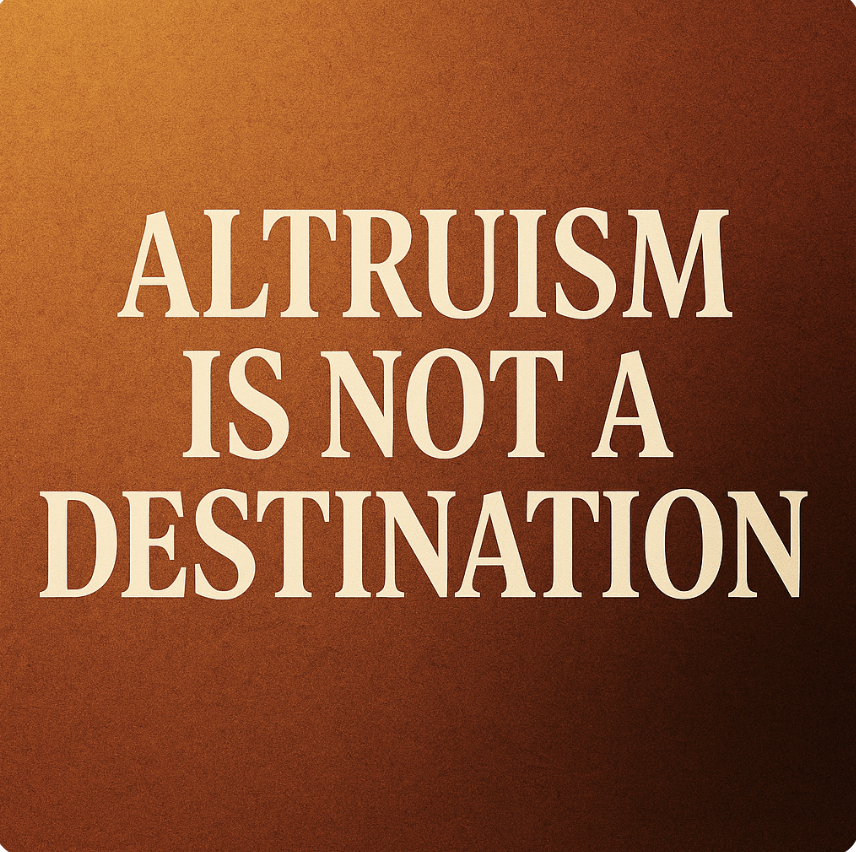Why Altruism is a Mental Illness
Selfishness vs Altruism
May 4, 2025
by Songgun Lee

Altruism is not a destination. It is not synonymous with love, nor is it the ideal mindset.
To be clear, if one had to choose a guiding principle, "live altruistically" is generally a far better choice than "live selfishly." In most cases, altruism brings about better outcomes in one's personal life.
However, those who insist on blind, absolute altruism—who preach "always be selfless" without room for nuance—are far more dangerous than those who advocate selfishness. At least the selfish reveal something others can learn from. But the blindly altruistic hide behind masks of goodness, showing hypocrisy, discomfort, and a kind of moral manipulation that ultimately pushes others toward selfishness. It's more honest to live with one's true intentions than to conceal them beneath a veneer of virtue.
Altruistic people often do not question their own beliefs. They live in imagined realities, unaware of how their ideas might disturb others, believing their delusions to be truths. They know they are perceived as good, and they play the part convincingly—soft-spoken, agreeable, conflict-avoidant. They suppress disagreement under the guise of tolerance and shower others with passive, hollow courtesy. People sense something off, but it's hard to challenge them. Their image of kindness shields them from criticism, even when their presence feels unsettling.
Compared to them, the openly selfish are more respectable, if only for their honesty. To avoid becoming a hypocrite, one must understand the true nature and origin of altruism.
Selfishness isn't abstract or philosophical; it's visceral and real. It is the desire for pleasure, comfort, safety—things that make our bodies feel good. When we are fed, rested, or sexually gratified, we feel joy. When our bodies suffer, we feel miserable. This is universal.
Altruism, in contrast, is not instinctive. It is taught. Human societies instill altruism through moral education, religion, and social expectation. But these teachings function only if one believes in, or submits to, ideals like divine will or rational duty—concepts that often remain theoretical and disconnected from everyday experience.
This is why people often perceive moral preachers—who speak of altruism yet act selfishly—as hypocrites. It's easier to admire someone honest about their selfishness than someone pretending to be selfless.
Ultimately, the foundation of altruistic behavior is selfishness. The motivation to make others happy comes from our desire to feel good, to avoid guilt, to build meaningful relationships, to achieve a sense of purpose or social reward. This doesn't taint altruism—it makes it understandable. It is because we are selfish beings that we are capable of altruistic acts. Self-interest is the root, the energy, and the biological foundation of our ability to care for others.
Hunger and sexual desire are often seen as selfish impulses. That's true—they can lead to negative consequences. But those same impulses are what allow us to live and reproduce. Without hunger and sexual desire, we wouldn't exist in this world. Selfishness, then, is the prerequisite for altruism. It is the wellspring of life itself.
Dividing selfishness and altruism into good and bad is reductive. Instead, we should speak of wise selfishness and foolish selfishness. Wise selfishness considers long-term consequences, evaluates risks, and acts for sustained happiness. Foolish selfishness seeks immediate gain at the cost of future suffering—for oneself and others.
Foolish selfishness manifests in two main forms: blatant greed and performative altruism. People who misunderstand love as merely emotional or moral goodness often conclude that caring for others is right and caring for oneself is wrong. But every moral tradition, from Confucianism to Christianity to Buddhism, ultimately links altruism to long-term personal well-being. To strip altruism of self-interest is to misunderstand its essence.
Suppressing self-interest too much leads to psychological illness. Repression causes buried desires to resurface as distorted behavior, disguised as virtue. People begin to fake altruism, not out of love, but to satisfy their twisted needs for control, recognition, or self-worth.
History shows that most brutal acts of conquest, invasion, and genocide were committed in the name of noble causes: justice, enlightenment, love, patriotism. Altruism, when unchecked, knows no guilt. This doesn't mean altruism is evil, nor is selfishness. Nor should we claim there's no difference between them. In fact, the notion that "everything is relative" is itself a danger—it dilutes wisdom and erodes clarity.
As your understanding deepens, what once felt abstract or moralistic will reveal itself as universal truth. When you see the world through love, it becomes lovable. When you act with care, others begin to care in return.
In the end, we don't behave altruistically because it's righteous—we do it because we want to be happy. The desire for serotonin, dopamine, and oxytocin is natural. Self-interest is the most human instinct we have, and it is also what enables us to build families, communities, and meaning.
It is not wrong to seek simplicity in messaging for the public. The masses need digestible truths. But behind that simplicity should be understanding—not delusion. It's time for honest, selfish people to challenge fake altruism. Speak up. Be real. And remember: one who stands still in this world will fall behind.
Choose your path with the long-term in mind. If your goal is happiness, then your method might involve hardship today. But better to walk a hard path knowingly than to chase an easy one blindly.